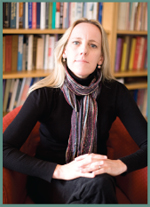For a New Year: Kiss Someone You Love and Hug Someone Who’s Different than You

SEVENTY-FIVE YEARS is more than just three-quarters of the way to a century. If you’ve worked hard and you’re in good health and you’ve known lots of people, seventy-five is a time to look back with some relish and think about what else you still want to do.
I’m happy to say that the Humanist magazine is alive and well at seventy-five, in large part because my predecessors (there have been a total of eleven editors before me) worked very hard and—together with their staff, contributors, and readers—kept the Humanist in fine health.
1941 was the year the American Humanist Association was founded and the Humanist magazine was launched under the editorship of Edwin H. Wilson. Preceding it was the Humanist Bulletin, published starting in 1935 by the Humanist Press Association, and before that the New Humanist, first published in 1927 by professors and seminarians at the University of Chicago who had formed the Humanist Fellowship.
But 1941 is the starting point for the magazine you see or hold before you—the Humanist—and in its second-ever issue, philosopher and Humanist Manifesto signatory Archie J. Bahm wrote that happiness through brotherhood was the aim of humanism. (Today we’d expand that brotherhood to all humans.) “Whenever a humanist excludes a way he becomes sectarian,” Bahm wrote, warning that the movement would be great only if it both permitted and permeated sects. “It is human to divide,” he noted, but stressed that humanism must somehow solve the problem of “the one and the many.”
So in this vein, the Humanist has, throughout its seventy-five year history, sought to comfort the afflicted and afflict the comfortable. Some of the illustrious contributors who’ve helped us do so—and who don’t appear on the cover or elsewhere in this anniversary issue—include (in no particular order): Gene Roddenberry, Linus Pauling, Margaret Sanger, Howard Zinn, Martin Luther King Jr., Alice Walker, Bertrand Russell, John Dewey, Margaret Atwood, Jack Kevorkian, Annie Laurie Gaylor, Isaac Asimov, John Kenneth Galbraith, Sidney Hook, Kurt Vonnegut, A. Philip Randolph, Allen Ginsberg, Benjamin Spock, Betty Friedan, Noam Chomsky, Peter Singer, Barbara Ehrenreich, E.O. Wilson, Richard Dawkins, Sherwin Wine, Michael Shermer, Ralph Nader, and Salman Rushdie.
Along with them, leaders of the humanist movement, philosophers, academics, scientists, AHA members, and all manner of freethinking fellow travelers have made the Humanist great. They’ve tackled issues related to religious freedom and human rights, scientific exploration and technology, politics, psychology, ethics, and art. The Humanist has been on the forefront reporting on landmines, sweatshops, and extraordinary rendition. On overpopulation, privacy, and sexual freedom. It has vigorously challenged creationism and intelligent design. It has highlighted the various journeys to the humanist worldview taken by the famous and not-so-famous alike. In short, the Humanist has and continues to provide its readers with intellectual and ethical adventure.
As I’ve read the voices of humanists from decades past, I feel proud to be associated with a publication that has engaged with the most important issues facing humanity. A warming planet is now our biggest threat, along with the worldwide proliferation of weapons and extremist ideologies. The barbarity of terrorists’ actions—the disregard for life, even that of one’s own child, in adherence to a strict interpretation of a religious text or in allegiance to an authoritarian force—is the antithesis of humanism. And so humanists are especially confounded by terrorists’ actions and motivations.
Trying to process where we’re at, here on the Humanist’s big birthday and at the beginning of a new year, there’s a line from a song by the band X that keeps running through my head, harkening back to the beloved L.A. punk scene of my youth: The world’s a mess it’s in my kiss. It’s impossible for fear and tragedy not to affect us, to permeate our thoughts and the way we move about in the world. But I hope that in this new year, we can each kiss someone we love and hug those who seem so very different than us.
